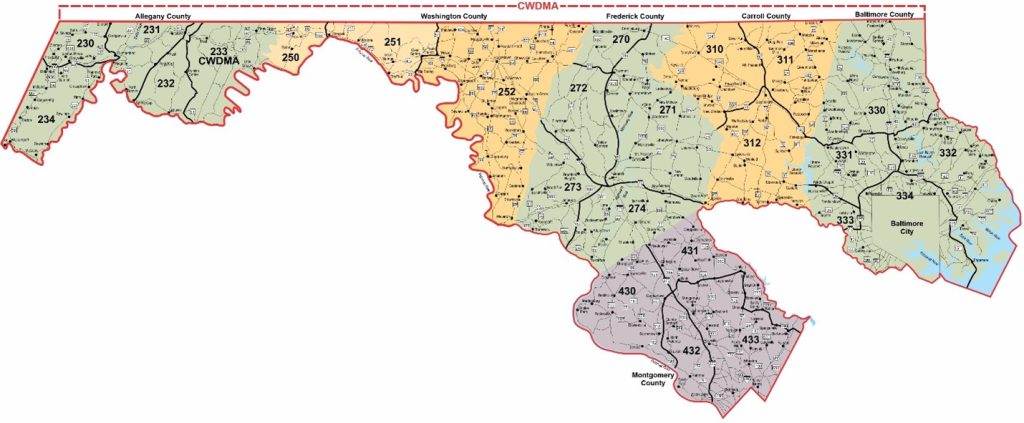The state’s chronic wasting disease management area has expanded to include two additional counties
 The Maryland Department of Natural Resources reported today that 52 white-tailed deer sampled within Allegany, Baltimore, Frederick, Montgomery and Washington counties in 2023 tested positive for chronic wasting disease, a neurological disease found in deer, elk, and moose.
The Maryland Department of Natural Resources reported today that 52 white-tailed deer sampled within Allegany, Baltimore, Frederick, Montgomery and Washington counties in 2023 tested positive for chronic wasting disease, a neurological disease found in deer, elk, and moose.
Of the positive samples, 49 came from within the existing chronic wasting disease management area (Allegany, Carroll, Frederick, and Washington counties), while one positive sample came from Baltimore County and two positive samples came from Montgomery County.
In response to finding positive samples in Baltimore and Montgomery counties, the Chronic Wasting Disease Management Area has been expanded to include all of Allegany, Baltimore, Carroll, Frederick, Montgomery, and Washington counties.
The Department of Natural Resources conducts annual surveillance and works with neighboring states to monitor chronic wasting disease in the deer population. Management areas are established to help keep hunters informed, regulate how deer carcasses can be transported, and hopefully slow the spread of the disease.
“Unfortunately, like many other states with chronic wasting disease, we are seeing the disease spread in Maryland,” Wildlife and Heritage Service Director Karina Stonesifer said. “The department will continue to monitor the disease closely, provide the public with the most up-to-date information on the disease, and follow the best science available for deer management.”
Maryland’s chronic wasting disease surveillance program began in 1999 and, to date, more than 14,394 deer have been tested. A total of 1,080 samples were submitted for laboratory testing from 2023.
Chronic wasting disease was first confirmed in Maryland in February 2011. Maryland, Pennsylvania, Virginia, and West Virginia have all documented chronic wasting disease in the region. The latest findings bring the number of positive cases in Maryland to 223. According to the U.S. Geological Survey, Maryland is one of 33 states and four Canadian provinces with chronic wasting disease documented in free-ranging cervids in North America.
Concerns about chronic wasting disease should not stop anyone from hunting deer or enjoying venison. Research suggests the disease cannot be naturally transmitted to humans. However, as a general safety precaution it is recommended that hunters avoid consuming the meat of sick animals as well as the brain, lymph nodes or spinal column of any deer — all of which are normally removed during the butchering process.
Hunters and other wildlife enthusiasts can help by reporting any deer that are emaciated, unhealthy, or acting abnormally. Hunters can also help by granting permission to the department to collect tissue samples from harvested deer. The department can be reached at 410-260-8540.
To find more information on chronic wasting disease in Maryland, citizens should visit the Maryland Department of Natural Resources website.
 The Maryland Department of Natural Resources reported today that 52 white-tailed deer sampled within Allegany, Baltimore, Frederick, Montgomery and Washington counties in 2023 tested positive for chronic wasting disease, a neurological disease found in deer, elk, and moose.
The Maryland Department of Natural Resources reported today that 52 white-tailed deer sampled within Allegany, Baltimore, Frederick, Montgomery and Washington counties in 2023 tested positive for chronic wasting disease, a neurological disease found in deer, elk, and moose.Of the positive samples, 49 came from within the existing chronic wasting disease management area (Allegany, Carroll, Frederick, and Washington counties), while one positive sample came from Baltimore County and two positive samples came from Montgomery County.
In response to finding positive samples in Baltimore and Montgomery counties, the Chronic Wasting Disease Management Area has been expanded to include all of Allegany, Baltimore, Carroll, Frederick, Montgomery, and Washington counties.
The Department of Natural Resources conducts annual surveillance and works with neighboring states to monitor chronic wasting disease in the deer population. Management areas are established to help keep hunters informed, regulate how deer carcasses can be transported, and hopefully slow the spread of the disease.
“Unfortunately, like many other states with chronic wasting disease, we are seeing the disease spread in Maryland,” Wildlife and Heritage Service Director Karina Stonesifer said. “The department will continue to monitor the disease closely, provide the public with the most up-to-date information on the disease, and follow the best science available for deer management.”
Maryland’s chronic wasting disease surveillance program began in 1999 and, to date, more than 14,394 deer have been tested. A total of 1,080 samples were submitted for laboratory testing from 2023.
Chronic wasting disease was first confirmed in Maryland in February 2011. Maryland, Pennsylvania, Virginia, and West Virginia have all documented chronic wasting disease in the region. The latest findings bring the number of positive cases in Maryland to 223. According to the U.S. Geological Survey, Maryland is one of 33 states and four Canadian provinces with chronic wasting disease documented in free-ranging cervids in North America.
Concerns about chronic wasting disease should not stop anyone from hunting deer or enjoying venison. Research suggests the disease cannot be naturally transmitted to humans. However, as a general safety precaution it is recommended that hunters avoid consuming the meat of sick animals as well as the brain, lymph nodes or spinal column of any deer — all of which are normally removed during the butchering process.
Hunters and other wildlife enthusiasts can help by reporting any deer that are emaciated, unhealthy, or acting abnormally. Hunters can also help by granting permission to the department to collect tissue samples from harvested deer. The department can be reached at 410-260-8540.
To find more information on chronic wasting disease in Maryland, citizens should visit the Maryland Department of Natural Resources website.
